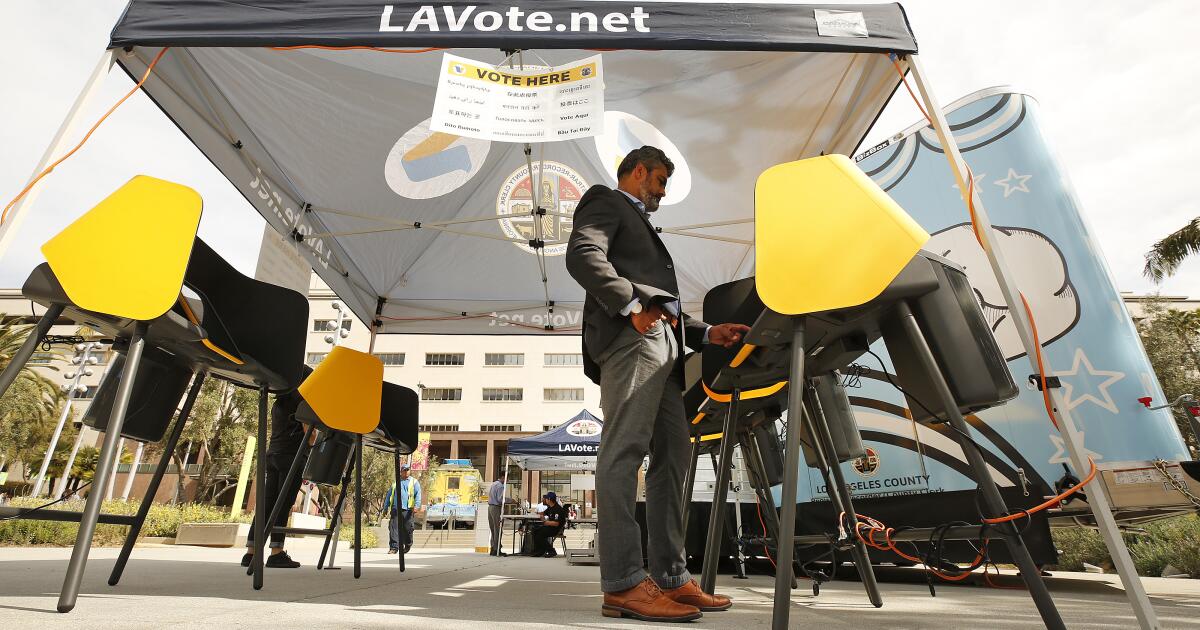Like many Democrats seeking support from progressive voters, Franky Carrillo — who is running for a Los Angeles seat in the state Assembly — pledged not to accept campaign donations from oil and tobacco companies when he was interviewed by local Democratic clubs early in his campaign.
What Carrillo didn’t tell them: At the time, he owned as much as $820,000 worth of stock in Exxon Mobil, Chevron and Philip Morris, among other fossil fuel and tobacco companies, and was using his personal wealth to finance his campaign.
Carrillo says he has since “fully divested,” without specifying which stocks he sold. The California Democratic Party does not accept contributions from the oil and tobacco industries, viewing them as out of step with efforts to advance public health and fight climate change.
Now Carrillo’s investment portfolio — which he says he seeded with money he received for being wrongfully convicted of murder in the 1990s — has become an issue in the Eastside race in which two Democrats are vying for a seat in Sacramento.
“I have stood by my pledge to run a campaign without that money,” Carrillo said in a statement to The Times. “I don’t see any contradiction, and I have divested. Meanwhile, many of those same industries are spending more than a million dollars combined against me and for my opponent.”
Franky Carrillo and Jessica Caloza, both Democrats, are competing to represent L.A.’s Eastside in the California Assembly.
(Jay L. Clendenin / Los Angeles Times))
Carrillo is referring to independent expenditures Chevron and Pacific Gas & Electric have made to support Jessica Caloza, who is also a Democrat. Pacific Gas & Electric has also contributed to committees that support Carrillo. Independent expenditures by groups that lobby at the state Capitol can be influential in legislative races, but are not directly controlled by candidates.
Candidates running for state office in California must submit a personal financial disclosure that shows their sources of income, gifts, investments and real estate holdings. Caloza reported no investments on the disclosure she filed in December 2023.
Carrillo was late in filing his economic disclosure, and paid the state’s election watchdog a $300 fine for missing the deadline to report it before the March primary. After he submitted his statement of economic interests, environmental advocates supporting Caloza raised concerns about what it showed: stock holdings in seven fossil fuel companies and three tobacco companies valued at a total of between $92,000 and $820,000, along with dozens of other investments. (The forms require reporting the value of investments in ranges.)
“We condemn Carrillo for his substantial investments in oil, tobacco, and coal that he claims to have sold only after these holdings became a campaign issue,” California Environment Voters, which has endorsed Caloza, wrote in a letter last month.
“If he has truly divested from these industries, the timing raises serious questions about accountability and transparency.”
On his campaign website, Carrillo says he wants to hold polluters accountable for the health risks they cause communities and help the state transition to a green economy.
He said he was not aware he held the fossil fuel and tobacco stocks because financial advisors control his investments. He said he divested in June 2024 but did not specify which stocks he sold when questioned by The Times.
The investments stem from a $10-million settlement from the Los Angeles County Sheriff’s Departmentthat Carrillo received in 2016.
Carrillo was a teenager when he was wrongly accused of murdering a Lynwood man in a drive-by shooting in 1991. He spent 20 years behind bars before his murder conviction was overturned in 2011 with the help of the Innocence Project, a nonprofit that fights wrongful convictions.
“Because I was 16 and poor when I was sent to prison, I did not have the opportunity to invest or learn how to invest,” he told The Times. He said he allocated “a significant portion of the settlement” to financial advisors to manage and that he was “not involved in the day-to-day” of those investments.
“When brought to my attention, I moved my investments and filled out the paperwork to correct this,” Carrillo said. “The process took time but was remedied.”
